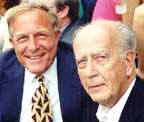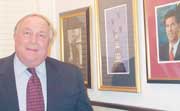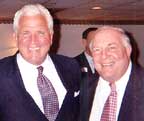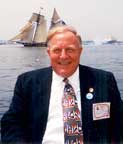 |
|||||||||||
|
Volume 13, Issue 5 ~ February 3 - February 9, 2005
|
|||||||||||
|
|
From the halls of Maryland's General Assembly to the walls of a halfway house for felons and back to Annapolis. by Sandra Olivetti Martin It's been a long fall for Bruce Bereano, Maryland's best known lobbyist: a felony conviction, disbarment, and now a new fight to continue the work he loves. "So I struck out," said Bruce Bereano with a there's-always-a-next-time shrug. Bereano had been lobbying to let motorcyclists remove their helmets. Del. Steve DeBoy, a Clinton-look-alike Democrat elected from Baltimore County two years ago, wouldn't sign on to the bill. "I've seen too much carnage," explained the former motorcycle cop. Bereano already had 52 sponsors on the bill, and he had plenty more doors to knock on. So with high praise to DeBoy - "You're the kind we need to keep the legislature focused on the people's business" - and a wisecrack - "though you make mistakes now and then" - Bereano was gone. Those are the kinds of moves that have made Bruce Bereano able to move mountains even when disgraced in fortune and men's eyes. Keeping cigarette machines in public places remains, he says, one of his proudest achievements. It's not that the lobbying was so tough - albeit the House did have to erase its earlier official vote to give Bereano the victory. It's that he moved two dozen votes while chained in the Department of Corrections' modern electronic version of leg irons. As Bruce Bereano counted the days to his 60th birthday, he was in trouble again. Already barred from practicing law, on December 30 he got word that his lobbying license also was being yanked. Unless he could win over Maryland's Court of Special Appeals, the 2005 General Assembly session - which is to lobbyists what Christmas is to retailers - would start without him. But he'd still be a man with obligations: mortgages on properties that include his home overlooking Whitehall Creek, not to mention legal fees close to a half-million dollars and climbing, by his count. A decade after his fall from grace, Bereano had still not rescaled the million-dollar heights that once made him Maryland's highest paid lobbyist. But $600,000 and climbing pays a lot of bills. For a decade, Bereano had been climbing back up from the bottom. Now, his ladder - his love, his livelihood, his life's work - was being snatched away. Worse than losing his living, Bereano risked slipping backward in his climb to regain his reputation. Bereano wouldn't be sidling up to powerful legislators to whisper in their ears. His many clients - among them insurance companies; the recording industry; Safeway; Volvo Trucks; firefighters; health clubs; black charities; motorcycle dealers; Maryland Hall for the Creative Arts; the Baltimore Street Car Museum; even the Maryland Coalition of Tattooists and Body Piercers - would be without their big stick in Annapolis. He was staggered. But Bereano punched back. On the third day of this new year, he asked Maryland's Court of Special Appeals to save his license to lobby by overturning a county circuit court as well as the State Ethics Commission. Never has Bereano been shy about asking for a lot - or appealing to higher powers. This is the man who went all the way to president Ronald Reagan to get a client out of jail. The client, former Maryland governor Marvin Mandel, came home free. To this day, Mandel - like Bereano himself - is a familiar and influential figure in Annapolis. The appeals court has yet to rule on Bereano's motion. So, by state rules, Maryland's champion persuader continues to glide the corridors of power, wining ears and votes. "I need all the prayers I can get. I'm a sinner. Sure I'll be there," Bereano promises the pair of prayer breakfast sponsors also working the morning halls of the Lowe House Office Building. Then, with a wink, he is gone.
In 1995, Bereano was on the verge of drawing his own Go Directly to Jail card. He had been convicted in federal court of mail fraud, and prosecutors were pushing for hard time. In a saga of legal twists and turns, Bereano was spared prison. Instead, he served five months in a halfway house, commuting to work in his Annapolis office while chained in the Department of Correction's modern electronic version of leg irons. The halfway house was a converted two-story motel on the edge of Baltimore. "We had to make our calls on pay phones," said Bereano, speaking in his Duke of Gloucester Street office during one of several interviews for this story. "One was outside my room, but it never worked," he recounted. "The other men complained, but the administration didn't do anything. We had the right to use those phones. So I called - on my office phone - the Bell Atlantic lobbyist. The pay phone was fixed the same day. The administration wasn't happy, but the other residents were." After the halfway house, Bereano spent five more months under home detention with work release, he paid $20,000 in fines and served 500 hours of community service - all this followed by five years probation. Except for the deaths of his parents, that sentence was the hardest blow he's absorbed in his life. "That was the low point. After I was convicted, a lot of people I thought were my friends scattered," said Bereano. "I lost a nine-year relationship with a woman I was deeply in love with. I lost an enormous amount of business. I went from an annual income of $900,000 to $214,000." The pain was the biggest motivator he's ever felt. "I really felt rock bottom," Bereano said. "Yet at some point, I knew I was going to have to start all over again and rebuild my livelihood and practice." Since his conviction, Bereano has been his own cause, his own case, his own client. To reclaim his name, he's working harder than ever. "I am very aggressive, dogged, tenacious," Bereano said. "I really don't quit and give up. I just don't; it's not my nature. My parents didn't bring me up that way." "How are you doing, delegate? A quick word ..." Bereano slides in on small talk, bits of praise, slivers of shared history, deference and banter. Soon, he's talking issues in the vernacular of each listener. With Del. Carolyn Krysiak of Baltimore, it's adoption. With Del. Michael Weir Jr. of Baltimore County - with whom Bereano wants to okay the details of a bill on all-terrain vehicles - it's outdoors sport and filial piety. Staring at you as you walk into Weir's office is a remarkable piece of taxidermy, the front half of a wild cock turkey. Like his father before him, Weir is a hunter and a Chesapeake Bay commissioner. "You're following in the footsteps of your father's 20 years in the legislature," Bereano says. "Twenty-eight years," Weir corrects.  Father of the Man Father of the ManFor his own parents, Bereano's reverence amounts to ancestor worship. Leon and Beatrice are not only "the finest parents a person could ever have." They are also his link to a family legend that charts a course through life's ups and downs. "From my parents, I got self-confidence," Bereano said. "If you work hard, study hard, prepare hard, you can succeed and achieve your goal." For generations, Bereano's family had proved that rule. On both sides, one grandparent immigrated from Romania and the other from Russia to seize the American Dream. "Both of my parents grew up in extremely wealthy households," said Bereano. "My father's father was a Manhattan physician. He came to America when he could not get in medical school in Romania because he was a Jew."  In the new land, that first generation American chose a new name with an Italian lilt. In the new land, that first generation American chose a new name with an Italian lilt.Bereano's maternal grandfather worked at New York's docks, selling fresh fruit and vegetables to retail stores and restaurants. In 1929, the stock market crash brought down both families. "They lost everything," Bereano said. Rejoining the working class, Beatrice Rothman, a finishing-school graduate, trained herself as a bookkeeper. The law school graduate learned to get beyond another disappointment. "He could never pass the bar exam," Bereano said. So Leon Bereano worked in insurance and real estate in Manhattan and owned a dry cleaner in the Bronx before finally achieving the standing he longed for as the pension fund administrator for the Fulton Street Market Union. Despite prosperity and reputation, Bereano's parents never forgot their fall - or eased up. "Every characteristic, I can clearly trace to them," Bereano said. "From hawking items at the temple bazaar to working in the family dry cleaner, I was working at a young age, developing salesmanship and my work ethic." "He's my brother," says Bereano, greeting a young legislative staffer transporting some of the tons of paper produced each day of the General Assembly.
On staff and staffed alike, Bereano lavishes attention and praise. "It's how you talk to people," he says of the Bereano salesmanship. "The choice of words, tone of voice, is diplomatic and polite. You look at the position the other person is in." In crowded hallways, he seldom passes a person he doesn't know, and he never passes without a greeting, usually followed up by a touch on the hand, back or shoulder. "Sure I have enemies here," Bereano says. "Friend or enemy, I smile at them all."
By some standards, Bereano's status as a felon better qualified him for his job. Lobbyist is a dirty word in many vocabularies, and Bereano's successes define the stereotype. Fat cats and perceived sinners - from cigarette manufacturers to gaming purveyors to devil-may-care bikers demanding to roar around helmets - have hired him to argue their cases. Bereano has never smoked. He doesn't ride a motorcycle. He doesn't much gamble. But time after time, he's won people the right to do all three. For persuading policy makers to see his side of an issue, he's earned big money for fat cats and freedoms for folks who live life on the wild side. He carries the rap of the hired gun who can travel light with no qualms. "I walk into a room with anti-smoking advocates, and they boo and hiss me," he said. He's used to the insults, Bereano says; they bounce right off. "Last session, I testified in the House opposing a bill regulating the placement of cigarettes over the counter," he recounted. "A young gal from Garrett County testified how bad smoking is. At the end of the hearing, I feel a jab in my back, and not just a tap. It's this high-school gal, and she starts criticizing me: ‘You sleaze, you liar.'" As Bereano tells it, such attacks "juice" him up to hustle all the more. "She was so in my face that I jacked it up and worked harder to kill the bill. And I succeeded," he said. Overzealous, say friends and detractors alike, trying to put their finger on why trouble dogs Bereano. "He pushes to the extent that he takes it to extremes," said Senate President Mike Miller, who has seen Bereano at work for a quarter of a century. "Like many driven people, Bruce has a hard time knowing where to stop. Often times, he pushes a little too hard and people react," Miller said. When he's opposed, Bereano bulls back like an angry linebacker. In a feud over parking tickets, he last week threatened the city. "Don't you dare threaten me with impoundment, towing or booting," he wrote, promising a lawsuit if the city didn't back down. Bereano holds on until he wins or is beaten back. "Almost indefatigable," summed up Rep. Steny Hoyer, one of Maryland's most durable Democratic politicians. Back when Hoyer was president of the state Senate, Bereano was counsel to the chamber and Hoyer's principal legislative assistant. "I'd come into work in the morning to find out Bruce had been there all night. He had the ability to put his head down on the desk, sleep for five or 10 minutes and wake up refreshed," Hoyer recalled in an interview. "He has amazing energy and ability to stay focused, and he's one of the hardest working people I've ever seen," Hoyer said. "That's why he's effective." Wrong or Wronged? Bereano has contended all along that he was traduced by enemies. As he waits for another court to slap him down or let him operate, his story of being wronged hasn't changed. "In each instance," Bereano contended, "my troubles were deliberately instigated by other people." He argues that the FBI investigation that led to his indictment was, he said, "through the obsessed and dastardly jealousy" of an outmaneuvered rival. "The feds disemboweled me, spending years pouring over every single piece of paper and activity," he said. For all their trouble, federal prosecutors could indict on only a charge of eight counts of illegally billing clients for money diverted to political contributions. A decade ago, lobbyists like Bereano could solicit contributions for political campaigns. Even so, prosecutors said Bereano crossed the line, disguising contributions on his bills to clients. Since Bereano's case, any "solicitation" has become a crime. The defrauding with which Bereano was charged amounted to $150 for each of four clients: Dental Benefit Providers, Medical Mutual, Phillips Publishing International and the Maryland Saltwater Sportfishermen's Association. The charge was mail fraud because he'd sent his bills and received payment by mail. Bereano argued all the way to Maryland's top court that he was the victim of vendettas. In fighting the felony rap, Bereano had allies as well as enemies. None of the four defrauded clients supported the charges, and all testified in Bereano's defense. "I do not personally believe that my firm was cheated as a result of our relationship with Mr. Bereano," wrote one, Dental Benefit Providers. When Bereano was sentenced, all four clients again spoke and wrote in his behalf. Jailing Bereano would be "a travesty and waste of the taxpayers' money," wrote a vice president for Phillips. At least one newspaper came out in print on Bereano's side. The Capital, Annapolis' paper of record, editorialized that the prosecution was "irresponsible" and that the case smacked of "federal witch hunting at its worst." Bereano's parents, both in their 80s, traveled from New Jersey to help defend their son. Bereano also got support from a congressman and his wife. "Together we consider Bruce to be a fine attorney, dedicated lobbyist and outstanding community activist," wrote then-Rep. Robert Ehrlich, speaking for himself and Kendel. "He's my guy," says Bereano more than once when Gov. Ehrlich's name comes up, as the lobbyist makes his morning rounds. Bereano keeps his appointment list the way he learned from Steny Hoyer. Bereano's planned stops - eight this January morning - are itemized on yellow legal paper folded down to letter size. When each is done, he checks it off and writes in the new promises to be acted on. The chance encounters are as much business as the planned stops, for each one binds him closer in the fraternity doing the business of state. "Yeah," he tells a pair of hospital lobbyists. "The governor called me in at the last minute on the medical malpractice override. I came up with a vote for him."  Climbing Back Up Climbing Back UpFriendship ranks only below devotion to parents and love for his son, a lawyer in Upper Marlboro, Bereano says, in his personal code of ethics. The Ehrlichs' support in his days of trouble won them his support when Ehrlich ran for governor in 2002. Never mind that Bereano is, as he puts it, a registered Democrat until he dies. Never mind that he worked for Robert F. Kennedy in the 1960s and, as a young man, styled himself a "Kennedy liberal." Never mind that it was Kennedy's eldest child, Kathleen Kennedy Townsend, who Ehrlich was opposing. "To me it was just sticking by friendship," Bereano said. "If there's one thing people know about me, I am profoundly loyal to my friends." In turn, loyal friends and clients get Bereano's credit for helping him climb back up from the bottom. "A staggering, enormous number of friends stayed in my corner," said Bereano, "and I could not have done it without them." Clients, including ones he was convicted of defrauding, kept Bereano on the payroll. The Medical Mutual Insurance Society and Maryland Association of Tobacco & Candy Distributors employ Bereano to this day. Comcast stayed with Bereano until 2003, when his much-publicized but never launched San Francisco sailboat for Maryland legislators broke the relationship. "Those allowed me a foundation to try and rebuild, which I have been doing," said Bereano. Bereano lobbied for 50 clients when he went to trial in 1994. By the end of 2004, Bereano's client list numbered 37. Still, by Bereano's reckoning he's "not entirely back. "It never will be the same. In my obituary, people will say, oh, he was so and so. There is an uncomfortable buzz when I walk in a room or meet a new client. It's part of my life I acknowledge and have to deal with," he said. Along with the loyalty of clients and friends, Bereano credits the lessons he learned from his parents for his ability to endure, indeed prosper, through 14 years in limbo. "You smile, keep your head up and continue to strive to be the best, to see and be seen everywhere, and to outwork your opposition," Bereano said. So far this year, Bereano has gained five new clients.
Bereano is never far from a fight. He lives to win, and every victory counts as somebody else's loss. Every fight begets new rounds. "He's aggressive," said Common Cause executive director James Browning, whose advocacy group typically is on the opposite side of Bereano's issues "I remember an occasion when he and I were supposed to meet with a certain committee chair at the same time. The chair let me in first, and took us out the back door so we could get away. Bereano found us and followed two steps behind us across town. I think that by stalking us, Mr. Bereano helped me make my point." Bereano is punctilious to the letter of the law - about which he can cite chapter and verse - but trouble continues to dog him. "From the grand jury investigation in 1991, it's been one thing after another," Bereano said. "The investigation, indictment, trial, conviction, appeals, serving the sentence, the ethics matter, losing my law license: Once one thing's over, something else pops up." In 2000, Bereano lost his law license as a result of his conviction. He appealed that loss all the way to the United States Supreme Court, which considered but did not hear his appeal. "My law license is a vital part of my being. Until I get it back," he said, "I will never feel whole." In 2003, the State Ethics Commission decided that Bereano was earning money in forbidden ways by making contingency contracts, with incentives for specified result. In the case in point, Bereano stood to take a percentage profit on new state business he brought Mercer Ventures, a temporary staffing company. The commission fined Bereano and suspended his lobbying license for 10 months. Mercer remains a client, and Bereano has been fighting the suspension ever since, filing the latest motion on January 3. Behind each of these troubles, Bereano says, is rivalry stoked with envy and malice, linking old enemies and a vengeful press. Reporters figure as enemy agents in Bereano's recount of his battles. "Media will make a heyday out of whatever I do, making it into something it was not," he contends. That's Bereano's explanation of how he came to make headlines over the last two years. First was the San Francisco sailing trip that lost him $80,000 a year from Comcast." Last July, he made the news again for raising money for a college fraternity brother's successful race for the District of Columbia city council. In his fundraising letter, Bereano noted that the candidate's cousin, Maryland Del. James Proctor would be grateful. The Washington Post story and the paper's subsequent editorial characterized the letter as inappropriate and one more chapter in the Bereano saga. "They're all into sensationalism," he said of the reporters who keep him in the news. "They're all trying to be Woodward and Bernstein [the Washington Post reporters who brought down Richard Nixon] instead of reporting the facts." Yet Bereano is routinely quoted as a reliable source by statehouse reporters, and in turn they chronicle not only his failings and his successes. About those stories he doesn't complain. Good and bad, he keeps his clips. "Bruce is one of those people like a lightning rod," Hoyer said. "He keeps himself high up in the air, and there he is for all the lightning to strike." Bereano's troubles are little as well as big. In recent days, he was talking three lawsuits - one over parking tickets. "That's Bruce for you," said a city spokesman. "Who but he would file a lawsuit over a parking ticket?" The problem that could have sparked a second suit went away. Lobbyists had been threatened with losing the instant-pass IDs that let them bypass security lines in state buildings. "It was resolved through the end of this session, and I'm optimistic we'll be able to resolve it finally," said Bereano, who admits to being the lobbyist who worked out the resolution. The third he filed in the state Court of Special Appeals. That's the one that's keeping him a working man - at least for now. By the time the sky darkened and temperature dropped, Bruce Bereano's list of sponsors for his motorcycle helmet bill has risen to 54. He'd be back working it again come morning. |
||||||||||
|
© COPYRIGHT 2004 by New Bay Enterprises, Inc. All rights reserved. |





